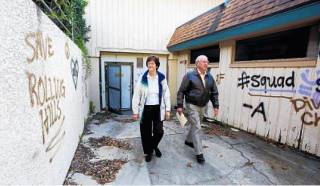|
Article
Courtesy of the Orlando Sentinel
By
Martin E. Comas Published
March 3, 2015
For decades, it stood as the centerpiece of the high-end Rolling Hills community, with acres of lush fairways and an elegant clubhouse. Now the old golf course is little more than a junkyard, a dirt track and a hangout for suspected drug dealers. The first blow came when Rolling Hills Golf Club closed. Seven months later, joy riders use the fairways to pop wheelies and carve doughnuts in the dirt. The former restaurant and pro shop are covered with graffiti. Motorists use the weed-filled greens as shortcuts across the neighborhood, and moldy mattresses, broken glass and empty cans litter portions of the course. “It’s just very depressing,” said Phil Taylor as he looked at the torn awnings outside his neighborhood’s old clubhouse. “This affects hundreds of people and the values of their homes.” Since the country club near Altamonte Springs closed last July, residents have been alarmed at its rapid decline. But it’s not just the graffiti, trash and overgrown fairways. Deputy sheriffs have been called out to the property dozens of times since July 1 for reports of burglary, criminal mischief, illegal dumping and property damage.
|
On Jan. 12, authorities said a 25-year-old man and a 19-year-old woman were arrested after a deputy caught them breaking into the old pro shop. Brandon Hamilton and Samantha Skinner each face drug and burglary charges.
“It’s a disgrace,” said Seminole County Commissioner Carlton Henley, whose home sits near Rolling Hills. “That was a beautiful golf course at one time. And that’s one of the last open spaces in that part of the county.”
County officials have slapped the property owners, Rolling Hills Reserve LLC, with more than $20,000 in liens for a variety of code-enforcement violations. |
|
Rolling Hills residents Sandy and Phil Taylor walk through graffiti on what’s left of the clubhouse at Rolling Hills Golf Club this week. Joy riders now use the former fairways, below, as a dirt
track.
|
Those violations include accumulation of garbage, rubbish and junk; letting the grass grow higher than 24 inches; having junk or inoperable vehicles not kept within an enclosed garage; and fences and walls missing boards and bricks.
Rolling Hills owners did not return calls or emails seeking comment.
Kevin K. Smith, who is listed on county records as the registered agent for the property, also did not return several messages.
A hearing before the county’s code-enforcement special magistrate is scheduled for March 12.
The story of Rolling Hills is a nightmare scenario that residents of other failed golf communities hope to avoid.
Across Central Florida, homeowners have watched frustration as their neighborhoods’ old courses have become jungles overrun with weeds and tall grass.
In the past decade, nearly a dozen courses in Central Florida have either closed or the owners are discussing building homes on the spaces as the sport of golf struggles in popularity.
Last November, Seminole County put in place tougher restrictions on the maintenance of large tracts of land, including old golf courses, in an effort to protect home values
In Orange County, commissioners this month discussed how to protect the rights of residents in golf-course communities.
Rolling Hills, its residents say, is an example of just how quickly neglect can mar a community.
Built in 1926, Rolling Hills had long been the site of regional golf tournaments and community gatherings. For decades, the surrounding homes made up one of Seminole County’s most upscale neighborhoods, even after the region’s big population boom of the early 1970s.
Homeowners are now concerned that the degraded golf-course property is inviting more crime and dropping property values. Residents estimate that home values have dropped by more than $45,000 since the course closed last July, based on recent home sales.
“When you spend $300,000 or $400,000 on a house, that’s a big concern,” said Keith
Papke, whose home overlooks the old No. 2 fairway. “The golf course was one of the big pluses for this community.”
Sheriff ’s officials said they have stepped up patrols in and around the Rolling Hills neighborhood in the past few months. And they encourage residents to report anything suspicious.
“I grew up here — my father used to play golf here,” said Michelle Mitchell, whose home overlooks one of the old fairways. “But now it’s not only depressing, it’s frightening … . We used to sit on our patios watching people play golf. Now we sit on our patios making sure people aren’t breaking into the clubhouse or pro shop.” |
